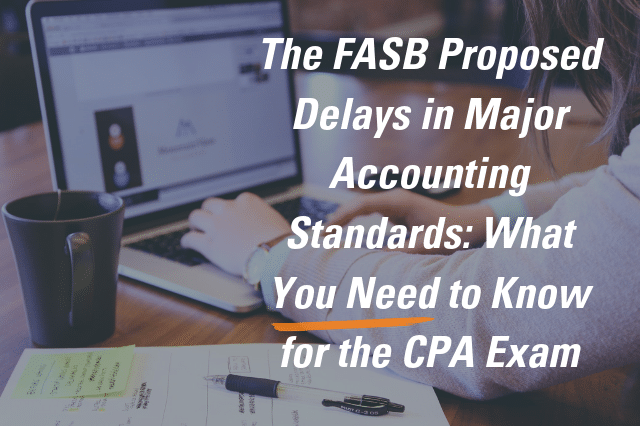On July 17, the Financial Accounting Standards Board proposed delaying a few major accounting standards updates for private companies, nonprofits, and smaller reporting companies. The FASB’s reconsideration of the effective dates of these new accounting standards had to do mostly with the burden it would place on financial reporting at these entities and how the FASB could facilitate a smooth transition to these new accounting standards within non-public entities.
The board considered the availability of resources to financial statement preparers, how long it would take to train staff, the challenges of developing and implementing solid IT systems to correspond with the changes, and the development of an accurate and complete financial reporting approach to the new FASB accounting standards. Taking all these factors into consideration, the FASB decided the best course of action was to delay the implementation of the new standards to allow companies to integrate them into their process before they were required to be adopted. Also, by delaying the standards for nonpublic companies, nonprofits, and smaller reporting entities, the FASB created an opportunity for these companies to learn from public companies that have already implemented the revised standards and were not impacted by the delay.
FASB’s proposed delays
The delay includes FASB accounting standards relating to leases, credit losses, hedge accounting, and long-duration insurance contracts for private companies, nonprofits, and smaller reporting entities. The proposed dates for the release of the standards are below:
- Lease Accounting – Jan. 1, 2021
- Derivatives and Hedging – Jan. 1, 2021
- Accounting for Credit Losses – Jan. 1, 2023
- Long-Duration Insurance Contracts – Jan. 1, 2024
Despite this delay for private entities, these standards will still go into effect for public companies as originally scheduled. FASB’s proposed plan has already led to implementation of some of these standards and would continue the release of pending standards for public companies on the following dates:
- Lease Accounting – Dec. 16, 2018
- Derivatives and Hedging – Dec. 16, 2017
- Accounting for Credit Losses – Jan. 1, 2020
- Long-Duration Insurance Contracts – Jan. 1, 2021
</ br>
The standards and the AICPA
While the Financial Accounting Standards Board is the standard-setting body in the United States, the AICPA decides whether to include those updates on the CPA Exam. As of now, the AICPA has not announced any new CPA Exam changes related to these pronouncements.
However, as an accounting professional and a candidate for the CPA Exam, it’s always a good idea to stay aware of the latest happenings in the accounting industry, if for no other reason than you’ll likely be working with these changes in your career someday, especially if you work with financial statements or U.S. GAAP in any capacity (which you likely will). Staying on top of standard updates will help you know what to expect on the CPA Exam and it will also make you a stand-out candidate on job interviews.
What to do when major CPA Exam changes are announced
The rapid succession of standard creation and updates in 2019 means that major CPA Exam changes are forthcoming and will include these updates in the first quarter of 2020. By staying in the know regarding any major accounting standards’ changes, as well as any major changes announced by the AICPA, you can be prepared for any CPA Exam changes in the future.
The absolute best way to know that the materials you’re studying are current and accurate is to make sure you get a review course that includes free, automatic updates to your exam prep materials. Surgent includes these updates with every package so you’ll always have the most relevant material for the exam section you’re taking.
When major exam changes are announced, Surgent provides two sets of materials: one if you’re taking the exam under the old format and content, and another if you’re taking the exam under the new format and content. This ensures you won’t have any interruptions to your studies and guarantees you will have access to relevant changes when you need them. You have the option to study either the old materials or the new materials depending on when you’re taking your exam.
Generally Accepted Accounting Principles are changing rapidly due to a variety of factors, from stakeholder security to the introduction of more and more technology within the business environment. Staying on top of these changes will not only make you a better CPA Exam candidate but a better future CPA.
Make sure that the CPA Review course you choose stays up to date with the latest AICPA changes to the exam. Choose Surgent CPA Review today!
Try Surgent CPA Review for free
Jack Castonguay, Ph.D., CPA, serves as the Director of Accounting & License Prepatory Content. He holds a BBA in Accounting and a Master of Science in Accounting from James Madison University and received his Ph.D. in Accounting from the University of Tennessee. Jack began his career in public accounting with a Big Four accounting firm auditing manufacturing and financial services clients. He has taught financial accounting and auditing at the graduate and undergraduate levels and is currently an assistant professor at Hofstra University.





